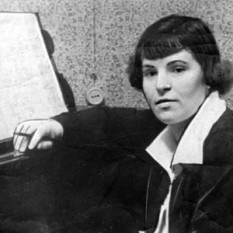Nikolai Andreevich Roslavets (Russian: Николай Андреевич Рославец) (4 January 1881 – 23 August 1944) was a significant Soviet modernist composer. Roslavets was a convinced modernist and cosmopolitan thinker; his music was officially suppressed from 1930 on.
Among his works are five symphonic poems (three of them are lost), two violin concertos, five string quartets, two viola sonatas, two cello sonatas, six violin sonatas, and five piano trios.
There are three autobiographies by Roslavets that differ considerably from one another. In one of them, published 1924, the composer deliberately misrepresented his biography in order to prevent the attacks by the "Proletarian Musician" faction. There are differing accounts of Roslavets' birthplace, some indicating that he was born in Dushatyn to a peasant family, while he actually was born in 1881 into the family of a railway clerk, (of Ukrainian origin, according to Detlef Gojowy) posted in Konotop and Kursk, where Roslavets began to study violin, piano, theory of music and harmony in Arkady Abaza's musical classes. In 1902 Roslavets was accepted as a student at the Moscow Conservatory where he studied violin under Jan Hřímalý, free composition under Sergei Vasilenko, counterpoint, fugue and musical form under Mikhail Ippolitov-Ivanov and Alexander Ilyinsky. He graduated in 1912, with a silver medal for his cantata Heaven and Earth after Byron's verse drama.
In the 1910s Roslavets' compositions were published in Russian Futurist journals, and futurist artists designed some covers for his music. After 1917 the composer became one of the most prominent public figures of "leftist art" in Russia, together with Arthur Lourié, Kazimir Malevich, Vsevolod Meyerhold and others. Roslavets taught violin and composition in Elets, Kharkiv (then known as Kharkov, where he was director of the Musical Institute) and Moscow. He had a position in the State Publishing House, edited the journal Muzykalnaya Kultura and was one of the leaders of the Association for Contemporary Music.
As a musicologist, Roslavets fought for professionalism, the best in Russian, Western classical and New Music; criticizing vulgar identifications of music with ideology (exemplified in his article ‘On pseudo-proletarian music’). He wrote the first Russian article about Arnold Schoenberg's Pierrot Lunaire. This led to him being harshly attacked in the 1920s by the "proletarian musician" movement, especially by the representatives of the "RAPM" Russian Association of Proletarian Musicians and "Prokoll" (Production Collective of the Students at the Moscow Conservatory). Roslavets was accused of being a "counter-revolutionary" and "bourgeois" artist, "alien to the proletariat", as well as "formalist", a "class enemy" and in the late 1920s and early 1930s, a "Trotskyist", "saboteur"; etc.
In 1928 Roslavets' cantata October was played in the concert in Moscow celebrating the 10th anniversary of the Revolution. In 1930 Roslavets was accused of being a "protector" of the Association of the Moscow Authors, which according to the group "Proletarian Musician" was promoting "light music" and "spreading of the counter-revolutionary literature". The "Roslavets case" was led by Viktor Bely, Alexandr Davidenko, V. Klemens, Yuri Keldysh, Semion Korev, Zara Levina, Georgi Polyanovsky, Alexey Sergeev and Boris Shekhter. It resulted in a professional prohibition of employment. In 1930 Roslavets was banned from obtaining a position as a political editor for two years. In order to save his life, Roslavets had to publicly repent for his former "political mistakes".
During 1932-33 he worked at the Musical Theater in Tashkent, now the capital of Uzbekistan. In 1933 the composer returned to Moscow, where he earned a meagre living by teaching and taking occasional jobs. A victim of the political purges; Roslavets could get no official position for the remainder of his life. Roslavets was not admitted to the Composers' Union, instead he became a member of the Musical Fund. Punitive measures against him had been planned in 1938, and the former "proletarian musicians" had already spread disinformation about him; however Roslavets suffered a severe stroke in 1939 and was a disabled until his death following a second stroke in 1944. His last publication, a song, appeared in 1942.
While still a student, Roslavets had been engaged in vigorous artistic debates provoked by Russian Futurism, and was close to artists such as Kasimir Malevich, Aristarkh Lentulov, Vasily Kamensky, David Burlyuk and others. Deeply influenced by the later works of Alexander Scriabin and his mystic chord, Roslavets' quest for a personal language began not later than in 1907; it led to his propounding a "new system of sound organisation" based on "synthetic chords" that contain both the horizontal and vertical sound-material for a work (a concept close to that of Schoenberg's twelve-tone serialism). Following an article of Vyacheslav Karatygin, published in February 1915, Roslavets was sometimes referred to as "the Russian Schoenberg," but in 1914 Nikolay Myaskovsky had already stressed the original nature of Roslavets' style. In an article published in 1925 the critic Yevgeni Braudo pointed out that this was no more helpful than calling Schoenberg "the German Debussy." Although in the 1920s Roslavets criticized Scriabin because of his "oversimplification", the "new system of sound organisation" was first of all inspired by Scriabin's ideas and concepts as these were transmitted by Leonid Sabaneyev, a close friend of both Scriabin and Roslavets.
He is buried in Vagan'kov cemetery in Moscow, and the authorities have now granted permission to mark his grave.
.
You can find information through the best music search engine - Muzlan.top 😊All materials on request "Николай Андреевич Рославец" are available on page Николай Андреевич Рославец
Yes of course. You can listen tracks on the page Николай Андреевич Рославец
Yes of course. You can download tracks on the page Николай Андреевич Рославец
This page is found by queries: Николай Андреевич Рославец all mp3, Николай Андреевич Рославец flac, Николай Андреевич Рославец song listen, Николай Андреевич Рославец song download, Николай Андреевич Рославец track minus

